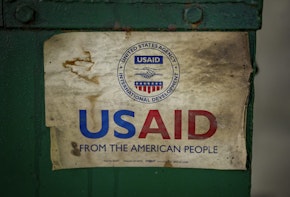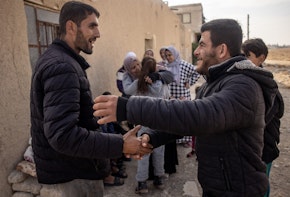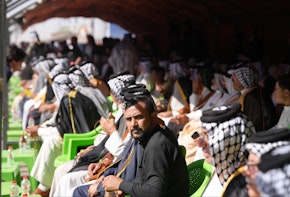Political experimentation and invention survive in unlikely places years after resurgent authoritarianism interrupted the Arab revolts. Despite violent conflict and state repression, attempts to build new institutions and ideologies continue outside the confines of traditional opposition politics.
In this volume, established researchers, new scholars, and active participants explore political initiatives in other realms: media, artists’ collectives, rebel enclaves, neighborhood councils, fledgling citizen campaigns, and elsewhere.
With rich ethnographic detail, these studies pay special attention to regional dynamics, cross-border learning, and the intellectual history of ideas central to the uprisings. They reveal an unresolved struggle between resilient authoritarian structures and alternative centers of political power.
Contributors include:
- Samer Abboud, The Economics of War and Peace in Syria: Stratification and Factionalization in the Business Community
- Nathan J. Brown and Benjamin Helfand, Reforming Justice: The Failure of Egypt’s Liberals
- Thanassis Cambanis, People Power and Its Limits: Lessons from Lebanon’s Anti-Sectarian Reform Movement
- Laura C. Dean, All Truth is Worth Publishing: Mada Masr and the Fight for Free Speech in Egypt
- Asya El-Meehy, Governance from Below: Comparing Local Experiments in Egypt and Syria after the Uprisings
- Karim Medhat Ennarah, The Ultras Ahlawy: Football, Violence, and the Quest for Justice
- Sima Ghaddar, Second-Class Citizenship: Lebanese Women Fight to Pass Nationality to Children and Spouses
- Jonathan Guyer, Speech Bubbles: Comics and Political Cartoons in Sisi’s Egypt
- Michael Wahid Hanna, Explaining Absence: The Failure of Egypt’s Liberals
- Cilja Harders and Dina Wahba, New Neighborhood Power: Informal Popular Committees and Changing Local Governance in Egypt
- Sam Heller, Keeping the Lights On in Rebel Idlib: Local Governance, Services, and the Competition for Legitimacy among Islamist Armed Groups
- Ursula Lindsey, Culture Is the Solution: As Political Reform Stalls, Moroccan Activists Engage Citizens through Art
- Marc Lynch, Mobilizing through Online Media: Why the Internet Still Matters for Change in the Middle East
- Aron Lund, Into the Tunnels: The Rise and Fall of Syria’s Rebel Enclave in the Eastern Ghouta
- Khaled Mansour, Egypt’s Human Rights Movement: Repression, Resistance, and Co-optation
- Monica Marks, Tunisia’s Unwritten Story: The Complicated Lessons of a Peaceful Transition
- Yasser Munif, Participatory Democracy and Micropolitics in Manbij
- Sultan Sooud Al Qassemi, The Politics of Egyptian Fine Art: Giving a Voice to the People
- Michael Stephens, The Arab Cold War Redux: The Foreign Policy of the Gulf Cooperation Council States since 2011
About the Editors
Thanassis Cambanis is a senior fellow at The Century Foundation in Beirut and columnist for The Boston Globe. His research focuses on Arab political and social movements, and U.S. policy in the Middle East.
Michael Wahid Hanna is a senior fellow at The Century Foundation in New York and an adjunct senior fellow at the Center on Law and Security at New York University School of Law. His research focuses on international security, international law, regional politics, and U.S. policy in the Middle East and South Asia.





